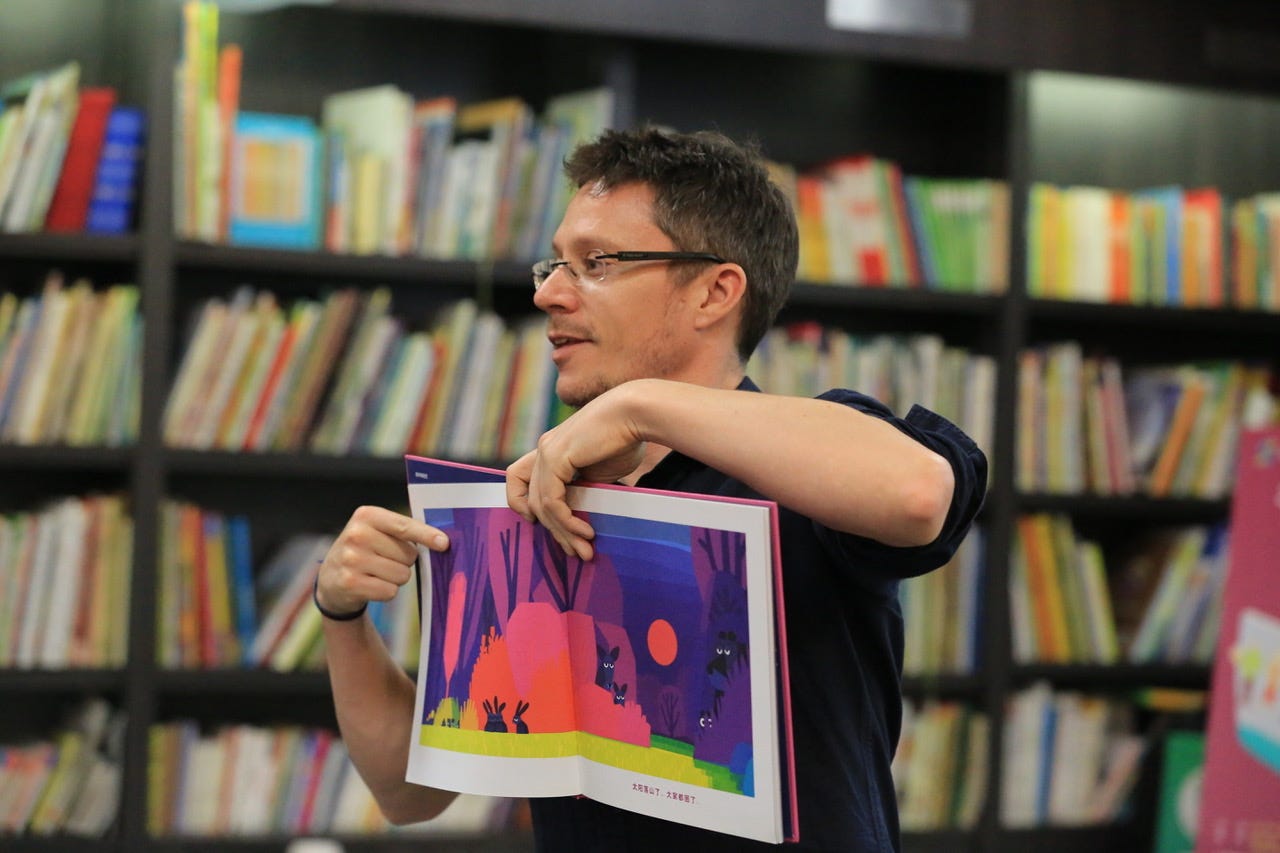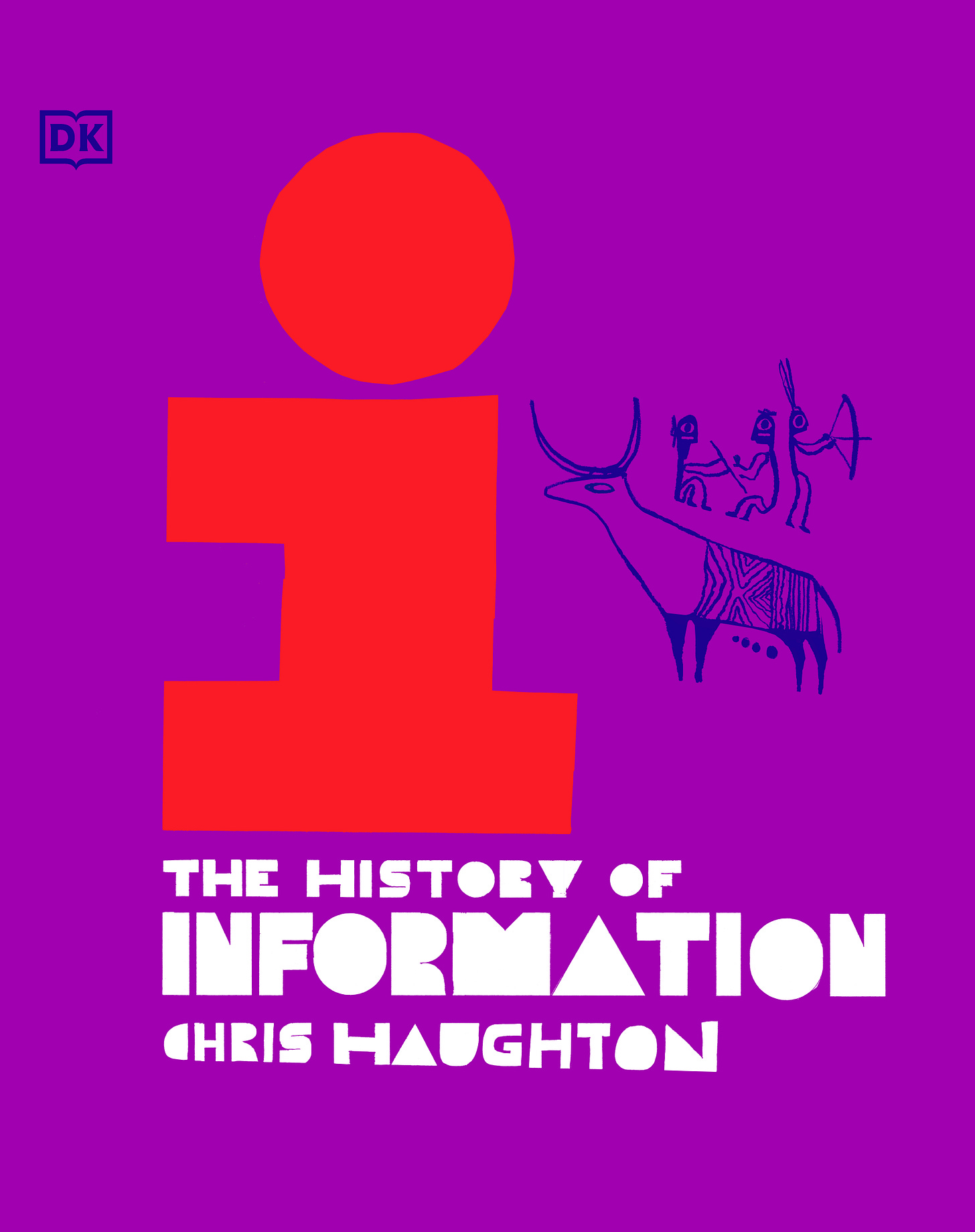The UK Government are trying to change copyright. This is how to stop it
Author Chris Haughton urges creatives to weigh in on AI Government Consultation
Image: Shows Chris Haughton, London-based author and illustrator doing a reading of one of his books. In the picture Chris is holding the book and talking. Credit: Chris Haughton
“I was angry. I worked as a volunteer for many years as copyright legal advisor for the AOI, the Association of Illustrators. So although I am not a lawyer, I am actually quite familiar with copyright law. And this, to me, is a very clear violation of it. All the GenAI companies know it is. I assumed they would get shut down once the bigger players like Getty got involved. I did not expect that a Labour Government would side with these copyright violators. But then when I heard that they had gotten funding from big tech it all makes sense.”
Chris Haughton, London-based author and illustrator relays.
He is of course talking about how Artificial Intelligence (AI) had used his work for training purposes. Chris was listed in Time magazine ‘Design 100’ for his work with People Tree, and has written and illustrated a number of books, including his new non-fiction title, The History of Information. As anyone in the creative sector will know, writing and publishing at this level, is a labour of love and would have taken countless hours of research, never mind dedication.
This isn’t the first time that we have raised this issue, back in 2023 we covered a similar case, where writer Rebecca Arnold’s books such as ‘30-Second Fashion’ and ‘Fashion: A Very Short Introduction,’ were some of 183,000 books found to have been used without permission to train generative-AI systems.
Under the current consultation, the Government is exploring what balance it should achieve between the IP and copyrights of creatives and the training required to grow AI systems. Chris argues:
“It is using our own work to compete against us. If this new law is the template we are working with it has the potential to decimate the entire cultural sector. The thing that worries me most is that the cultural sphere with its journalists, film makers, authors etc is what we all rely on to keep governments in check. If the sector starts losing jobs the industry will get more competitive, many of us will be forced to get regular jobs and it will weaken any resistance to further erosion on rights.”
A closer look at the consultation and it is easy to see why many creatives have been left feeling vulnerable. One of the included proposals is the suggestion to establish an “exemption to copyright law for text and data mining for commercial activities.” This would require copyright holders to reserve their rights to prevent AI models from using their work. This is arguably similar to the direction that the EU has taken. While the Government argues that this would enable growth and freedom for the UK’s AI industry, Chris feels this is the wrong direction:
“It’s been surprising to me because the cultural sector is huge in the UK. It is in a stronger financial position here than almost any other country I would imagine. I thought it would have had a bigger lobby. I am really shocked that this isn’t being fought by large publishers and media companies.”
The Creative Rights in AI Coalition, agrees and according to the House of Lords, has asked for the enforcement of existing copywriting laws to protect creatives from AI systems using their work for training without permission.
Image shows the front of Chris Haughton’s book. A purple background with a red ‘i’ and the words ‘The History of Information’ Chris Haughton. Credit Chris Haughton. Published by DK.
Remuneration
Perhaps the balance lies in creatives being remunerated when their work is used by AI for training purposes? But how to monitor this? One of the key issues it seems is whether the Government and big tech really value creative work and its process.
There is no doubt that creativity underpins the UK. Creative UK states that 95% of the creative sector in the UK is made up of micro-businesses with the sector making £101.5 billion in gross value added (GVA) per year. The fashion industry is a driving force in these figures, with a predicted global net worth of $2.04 trillion by 2029.
This is a huge, vibrant sector and certainly worth supporting, particularly if we imagine that those 95% who own micro-businesses and are affected by AI copyright issues, will be relying on their creativity and its output for their livelihoods. When copyright issues happen for individuals and micro-businesses there is no safety net, they are after all, not large corporations able to absorb these costs.
Chris feels that there are two alternatives which are fair – either everyone gets paid, or no-one gets paid. He elaborates:
“Jaron Lanier believes we all should get paid. I like his proposal that everyone who contributes to the dataset would earn a micropayment every time the AI creates work that uses their work. That sounds fair. And something like that really could work. We are the value in the AI. We should get to share the wealth our work generates.
“I also like Richard Stallman’s idea that all software should be ‘free’. I wrote about him in The History of Information. He is the leading voice of the open-source movement. He prefers to call it the free software movement, as he says free as in ‘free speech’ not as in free beer. These free software programs show us exactly what they are doing. […] Proprietary software is using us more than we are using it. There is nothing scary about AI. The scary thing is how it is owned and how it operates.
“Technology can and should be a positive thing in society. But the way it is owned means it has turned into a tool against us. Wikipedia is the model we should be copying. Not Google or Facebook. Wikipedia is non-profit, open source, completely transparent. We should run these services more like that. I deleted twitter and am considering deleting facebook and instagram. I suspect in the longer term people are going to look for alternatives.”
Moving forward, Chris would like to see the Government:
“[…] doing their job and enforcing the copyright law as it stands. That is all. These GenAI companies have knowingly broken the law. I would also like to see laws that curtail lobbying. It is corruption. The reason the US and UK governments are in the state they are in is because of the influence of money on politics. We need it to stop.”
In our ‘Delivering a Sector Vision Recommendations’ last year, we proposed the following policies:
Key Policy Asks:
An individual body to act on IP issues between the creative sector and AI.
A roadmap which takes responsibility for the potential impacts of AI on the labour market; its impact on skills and the required steps to mitigate devastating job losses.
A long-term focused and robust policy framework with a rights-based and people-focused approach to AI, and for a process that puts the voices and interests of workers at its heart.
Transparency around the use of AI. That all AI designs and marketing be labelled as such, to ensure that those created by people are set apart. Similar to the Competition and Markets Authority policy for content creators and influencers on transparency around ads.
Stringent IP regulation that protects creatives and their work from the use in training of AI programmes and systems.
This consultation closes at 23:59 on 25 February 2025.
You may respond via Citizen Space. Alternative, please send responses to copyrightconsultation@ipo.gov.uk. To ensure that the consultation can make best use of your evidence, please make sure relevant methodologies and data are included or clearly referenced as part of your response, where possible. Qualitative evidence is also welcome, such as case studies. Please consider the guidance on providing evidence for policy making when drafting your response.





